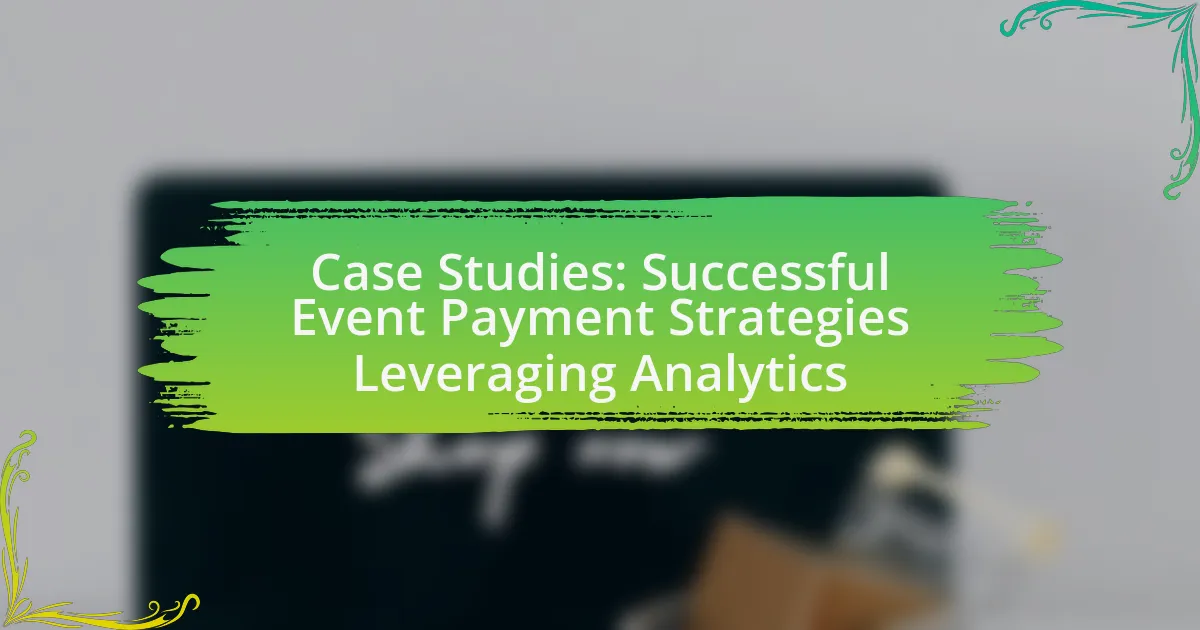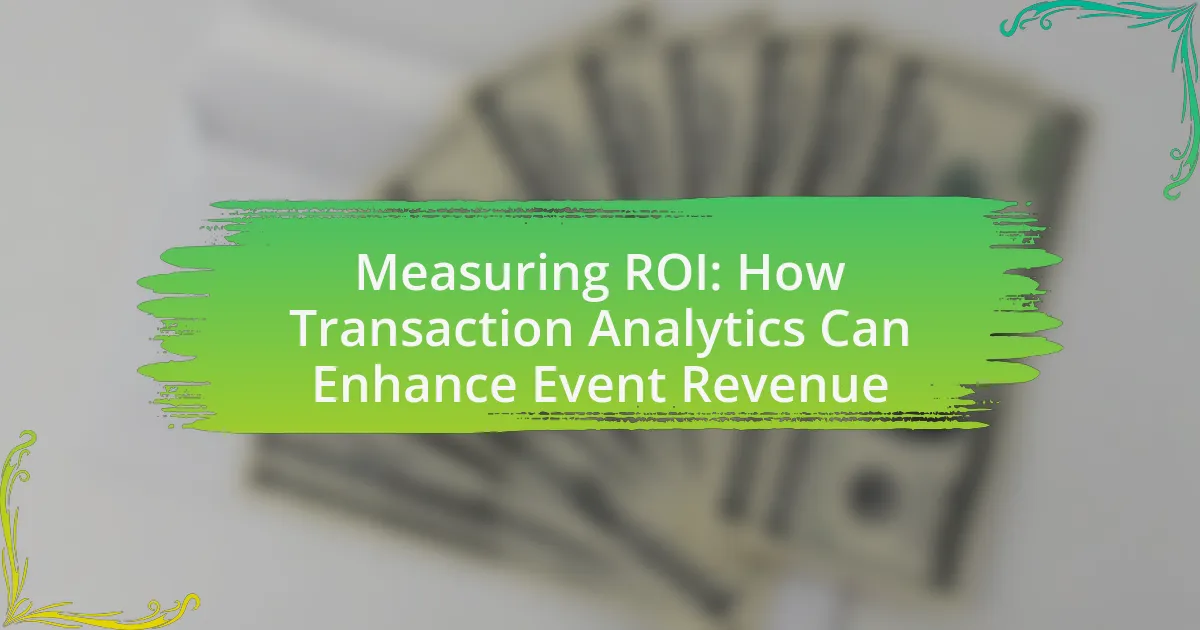Mobile payment solutions are digital platforms that facilitate quick and secure transactions via mobile devices, significantly impacting event attendance. These solutions streamline ticket purchases, concessions, and merchandise sales, enhancing attendee convenience and satisfaction. Key technologies such as Near Field Communication (NFC) and tokenization underpin these systems, ensuring security and efficiency. The integration of mobile payments with event management systems allows organizers to optimize operations and improve financial tracking. Despite challenges such as security concerns and technical issues, the advantages of mobile payment solutions, including increased revenue and higher attendance rates, make them essential for modern event management.
What are Mobile Payment Solutions and Their Role in Events?

Mobile payment solutions are digital platforms that enable users to make transactions using their mobile devices, facilitating quick and secure payments. In the context of events, these solutions streamline the payment process for attendees, allowing for faster entry, reduced wait times at concessions, and enhanced overall convenience. For instance, a study by Statista indicates that mobile payment usage at events can increase transaction speed by up to 50%, significantly improving attendee satisfaction and engagement. Additionally, mobile payment solutions often integrate with event management systems, providing organizers with real-time sales data and insights, which can enhance operational efficiency and decision-making.
How do mobile payment solutions function in the context of event attendance?
Mobile payment solutions facilitate event attendance by enabling quick and secure transactions for ticket purchases, concessions, and merchandise. These solutions utilize technologies such as Near Field Communication (NFC) and QR codes, allowing attendees to make payments using their smartphones without the need for cash or physical cards. For instance, a study by the National Retail Federation found that 75% of consumers prefer mobile payments for their convenience and speed, which enhances the overall event experience. Additionally, mobile payment systems often integrate with event management platforms, streamlining check-in processes and reducing wait times, thereby improving attendee satisfaction and engagement.
What technologies underpin mobile payment solutions?
Mobile payment solutions are underpinned by technologies such as Near Field Communication (NFC), Secure Element (SE), and tokenization. NFC enables contactless transactions by allowing devices to communicate wirelessly over short distances, facilitating quick payments. The Secure Element provides a secure environment for storing sensitive payment information, ensuring that data is protected during transactions. Tokenization replaces sensitive data with unique identifiers or tokens, minimizing the risk of fraud by ensuring that actual payment details are not transmitted during transactions. These technologies collectively enhance security and convenience in mobile payments, making them widely adopted in various sectors, including event attendance.
How do mobile payment solutions integrate with event management systems?
Mobile payment solutions integrate with event management systems by enabling seamless transactions for ticket purchases, merchandise sales, and donations directly through the event platform. This integration allows event organizers to streamline the payment process, enhance attendee experience, and improve financial tracking. For instance, platforms like Eventbrite and Ticketmaster offer built-in mobile payment options, allowing users to pay via digital wallets such as Apple Pay or Google Pay, which can increase conversion rates by reducing friction during the checkout process. Additionally, real-time data from these transactions can be analyzed to optimize future events, demonstrating the effectiveness of mobile payment integration in enhancing overall event management.
What are the advantages of using mobile payment solutions for event attendance?
Mobile payment solutions enhance event attendance by providing convenience, speed, and improved security for transactions. These solutions allow attendees to purchase tickets and merchandise directly from their smartphones, reducing the need for cash or physical tickets. According to a study by the National Retail Federation, 75% of consumers prefer mobile payments for their ease of use, which can lead to higher attendance rates at events. Additionally, mobile payments often include features like digital receipts and transaction tracking, which enhance the overall attendee experience and streamline event management.
How do mobile payment solutions enhance the attendee experience?
Mobile payment solutions enhance the attendee experience by providing convenience and speed during transactions. Attendees can make purchases quickly using their smartphones, reducing wait times at events. For instance, a study by the National Retail Federation found that 75% of consumers prefer mobile payments for their speed and ease of use. This efficiency allows attendees to focus more on the event itself rather than on logistical hassles, ultimately improving overall satisfaction.
What financial benefits do event organizers gain from mobile payment solutions?
Event organizers gain several financial benefits from mobile payment solutions, including increased revenue, reduced transaction costs, and improved cash flow. By enabling quick and convenient transactions, mobile payment solutions can lead to higher sales volumes, as attendees are more likely to make impulse purchases when payment is seamless. Additionally, mobile payment systems often have lower fees compared to traditional payment methods, which helps organizers retain more of their revenue. Furthermore, these solutions facilitate faster processing of payments, allowing organizers to access funds more quickly, thereby enhancing overall cash flow management.
How do Mobile Payment Solutions Influence Event Attendance Rates?

Mobile payment solutions significantly enhance event attendance rates by streamlining the ticket purchasing process and improving overall attendee convenience. Research indicates that events offering mobile payment options experience higher ticket sales, as attendees prefer the ease of purchasing tickets through their smartphones. For instance, a study by Eventbrite found that events utilizing mobile payments saw a 20% increase in attendance compared to those that did not. This increase is attributed to reduced friction in transactions, allowing attendees to buy tickets quickly and efficiently, thus encouraging more spontaneous attendance.
What impact do mobile payment solutions have on ticket sales?
Mobile payment solutions significantly enhance ticket sales by providing convenience and speed in transactions. These solutions reduce friction in the purchasing process, allowing consumers to buy tickets quickly from their smartphones without the need for cash or physical cards. A study by the National Retail Federation found that 75% of consumers prefer mobile payments for their ease of use, which directly correlates with increased ticket sales for events. Additionally, mobile payment platforms often integrate promotional offers and loyalty rewards, further incentivizing purchases and boosting overall sales figures.
How do mobile payments affect the speed of ticket purchasing?
Mobile payments significantly increase the speed of ticket purchasing by streamlining the transaction process. Traditional payment methods often involve multiple steps, such as entering card details and waiting for authorization, which can be time-consuming. In contrast, mobile payments utilize technologies like digital wallets and QR codes, allowing users to complete transactions in seconds. For instance, a study by the National Retail Federation found that mobile payment transactions can be completed up to 50% faster than traditional methods, enhancing the overall purchasing experience and reducing wait times at events.
What role does convenience play in increasing attendance through mobile payments?
Convenience significantly enhances attendance through mobile payments by streamlining the purchasing process for event tickets. When attendees can quickly and easily complete transactions via their smartphones, it reduces barriers such as long lines or complicated payment methods. A study by the National Retail Federation found that 75% of consumers prefer mobile payments for their speed and ease of use, indicating that this preference can lead to higher attendance rates at events. Additionally, mobile payments often allow for features like digital ticketing and instant confirmations, further simplifying the experience and encouraging more people to attend.
How do mobile payment solutions affect attendee demographics?
Mobile payment solutions significantly influence attendee demographics by attracting a younger, tech-savvy audience. Research indicates that 70% of millennials prefer using mobile payments, which aligns with their digital lifestyle and convenience needs. This shift in payment preferences often leads to increased attendance from younger generations at events, as they are more likely to engage with platforms that offer seamless, cashless transactions. Additionally, events that implement mobile payment solutions report higher participation rates from attendees who value efficiency and speed in their purchasing experiences.
What age groups are more likely to use mobile payment solutions at events?
Individuals aged 18 to 34 are more likely to use mobile payment solutions at events. This age group, often referred to as millennials and Gen Z, demonstrates a higher comfort level with technology and digital transactions. According to a study by Statista, 69% of millennials have used mobile payment methods, indicating a strong preference for cashless transactions in various settings, including events. Additionally, research from the National Retail Federation shows that younger consumers are more inclined to adopt innovative payment solutions, further supporting the trend of increased mobile payment usage among this demographic at events.
How do cultural factors influence the adoption of mobile payments for events?
Cultural factors significantly influence the adoption of mobile payments for events by shaping consumer attitudes, trust levels, and technological acceptance. For instance, in cultures with a high level of digital literacy and trust in technology, such as in Scandinavian countries, mobile payment adoption is more prevalent, with over 80% of the population using mobile payment solutions. Conversely, in cultures where cash transactions are deeply rooted or where there is skepticism towards technology, such as in some regions of Africa, mobile payment adoption may be slower. Additionally, cultural norms regarding privacy and data security can affect willingness to use mobile payments; in cultures that prioritize privacy, consumers may hesitate to adopt mobile payment systems that require personal information.
What Challenges Do Event Organizers Face with Mobile Payment Solutions?

Event organizers face several challenges with mobile payment solutions, including security concerns, technical issues, and user adoption barriers. Security is a significant issue, as organizers must ensure that payment systems are secure to protect sensitive customer data; breaches can lead to financial loss and damage to reputation. Technical issues, such as connectivity problems or system failures during events, can disrupt transactions and frustrate attendees. Additionally, user adoption barriers arise when attendees are unfamiliar with mobile payment methods or lack access to compatible devices, which can limit the effectiveness of these solutions. According to a study by the National Retail Federation, 40% of consumers express concerns about the security of mobile payments, highlighting the importance of addressing these challenges for successful event management.
What security concerns are associated with mobile payment solutions at events?
Mobile payment solutions at events face several security concerns, primarily including data breaches, fraud, and unauthorized access. Data breaches can occur when sensitive information, such as credit card details or personal identification, is intercepted during transactions, potentially affecting thousands of attendees. According to a report by Verizon, 28% of data breaches in 2020 involved payment card information, highlighting the vulnerability of mobile payment systems. Fraud is another significant concern, as attackers may use stolen credentials to make unauthorized purchases, leading to financial losses for both consumers and event organizers. Additionally, unauthorized access to mobile payment applications can compromise user accounts, further exacerbating security risks. These concerns necessitate robust security measures, such as encryption and two-factor authentication, to protect users and maintain trust in mobile payment solutions at events.
How can event organizers mitigate risks related to mobile payment fraud?
Event organizers can mitigate risks related to mobile payment fraud by implementing robust security measures such as encryption, tokenization, and two-factor authentication. These measures protect sensitive payment information during transactions, reducing the likelihood of unauthorized access. For instance, according to a report by the Federal Trade Commission, businesses that adopt encryption can significantly decrease the risk of data breaches, which are often exploited for fraud. Additionally, regular security audits and employee training on recognizing phishing attempts further enhance the security framework, ensuring that both the organizers and attendees are safeguarded against potential fraud.
What measures can be taken to ensure data privacy for attendees?
To ensure data privacy for attendees, organizations should implement robust encryption protocols for data transmission and storage. Encryption protects sensitive information, such as payment details and personal identifiers, from unauthorized access. According to the National Institute of Standards and Technology (NIST), using strong encryption standards, such as AES-256, significantly reduces the risk of data breaches. Additionally, organizations should conduct regular security audits and vulnerability assessments to identify and mitigate potential risks. Implementing strict access controls ensures that only authorized personnel can access attendee data, further enhancing privacy. Furthermore, providing clear privacy policies and obtaining informed consent from attendees regarding data usage fosters transparency and trust.
How do technical issues impact the effectiveness of mobile payment solutions?
Technical issues significantly reduce the effectiveness of mobile payment solutions by causing transaction failures, delays, and user frustration. For instance, a study by the Federal Reserve indicated that 30% of users experienced issues during mobile transactions, leading to abandoned purchases and decreased user trust. These technical problems can stem from poor internet connectivity, software bugs, or compatibility issues with devices, which directly affect the speed and reliability of payment processing. Consequently, when users encounter these obstacles, they are less likely to utilize mobile payment options at events, ultimately impacting attendance and revenue generation.
What common technical challenges arise during events using mobile payments?
Common technical challenges during events using mobile payments include network connectivity issues, system integration problems, and security vulnerabilities. Network connectivity issues can lead to transaction failures, as mobile payment systems rely heavily on stable internet access. System integration problems may arise when mobile payment platforms do not seamlessly connect with existing event management systems, causing delays and confusion at points of sale. Security vulnerabilities can expose sensitive customer data, leading to potential fraud and loss of trust in mobile payment solutions. These challenges can significantly impact the overall event experience and attendance.
How can event organizers prepare for potential technical failures?
Event organizers can prepare for potential technical failures by implementing a comprehensive contingency plan that includes backup systems and regular testing of all technology. This preparation involves identifying critical technology components, such as payment processing systems, and ensuring that alternative solutions, like manual payment methods, are available. Additionally, conducting thorough rehearsals before the event can help identify potential issues, allowing organizers to address them proactively. Research indicates that events with robust technical support and contingency measures experience fewer disruptions, enhancing overall attendee satisfaction and engagement.
What best practices should event organizers follow when implementing mobile payment solutions?
Event organizers should prioritize user experience, security, and integration when implementing mobile payment solutions. Ensuring a seamless user experience involves selecting a mobile payment platform that is easy to navigate and supports various payment methods, which can enhance attendee satisfaction and increase transaction speed. Security is critical; organizers must choose solutions that comply with industry standards, such as PCI DSS, to protect sensitive financial information. Additionally, integrating mobile payment systems with existing event management software can streamline operations, allowing for real-time tracking of sales and inventory. According to a study by Statista, 45% of consumers prefer mobile payments for their convenience, highlighting the importance of adopting effective mobile payment practices to boost event attendance.
How can organizers effectively promote mobile payment options to attendees?
Organizers can effectively promote mobile payment options to attendees by utilizing multiple communication channels, such as social media, email newsletters, and event websites. By highlighting the convenience and speed of mobile payments, organizers can attract attendees who prefer quick transactions. For instance, a study by the National Retail Federation found that 75% of consumers are more likely to use mobile payments if they are promoted effectively. Additionally, offering incentives, such as discounts or exclusive access for those who use mobile payments, can further encourage adoption.
What strategies can enhance the user experience with mobile payments at events?
Implementing user-friendly interfaces and ensuring seamless transaction processes can significantly enhance the user experience with mobile payments at events. Simplifying the payment process by minimizing the number of steps required to complete a transaction reduces user frustration and increases satisfaction. For instance, a study by the National Retail Federation found that 70% of consumers prefer mobile payments that allow for quick and easy transactions. Additionally, providing multiple payment options, such as digital wallets and contactless payments, caters to diverse user preferences and can lead to higher adoption rates. Furthermore, ensuring robust security measures builds trust, as 60% of users express concerns about the safety of mobile payments, according to a survey by Statista. By focusing on these strategies, event organizers can create a more efficient and enjoyable payment experience for attendees.






